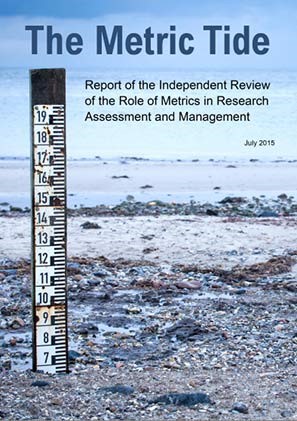Victoria Moody, Director of Impact and Communications for the UK Data Service discusses the Service’s new #CiteTheData campaign. Share your data citation activity, stories and thoughts – comment here and find us on Twitter @UKDSImpact #CiteTheData.
The UK Data Service welcomes the publication of The Metric Tide – a report on the independent review of the role of metrics in research assessment and management, chaired by Professor James Wilsdon.
In particular, we welcome Recommendation 13 that: “The use of digital object identifiers (DOIs) should be extended to cover all research outputs. This should include all outputs submitted to a future REF for which DOIs are suitable, and DOIs should also be more widely adopted in internal HEI and research funder processes. DOIs already predominate in the journal publishing sphere – they should be extended to cover other outputs where no identifier system exists, such as book chapters and datasets.”
The citation of research data (and metadata) can support the understanding and promotion of research impact through the tracking of the use of data in research and on into policy and product development, influencing decisions about public and commercial spending and service provision.
Citing research data isn’t new; the UK Data Service and other data repositories around the world have been requiring it as part of their standard user agreement for many years. Citing data using persistent identifiers (such as DOIs) supporting verification and attribution or research, helps people to understand the impact of the research and offers the realisation and demonstration of efficiencies through re-use. ‘Persistence’ means that, even if the location of the data changes, the DOI won’t, so it always links to the data that were used for that piece of research. A DOI is automatically assigned to any data collection deposited into the UK Data Service. In 2012, DOIs became part of a new international standard, ISO 26324. Citing data is as easy, and uses the same techniques, as citing a book or journal article. To make it even easier, the UK Data Service helps its users by providing pre-formatted data citations with all its collections. You can find our guidance on citing data on YouTube
In her post for the e-science community blog: Tracking the impacts of data, Stacy Konkiel gives an overview of the different types of data metrics, noting that “as few as 25% of journal articles tend to formally cite data. (Sad, considering that so many major publishers have signed on to FORCE11’s data citation principles, which include the need to cite data packages in the same manner as publications.) Instead, many scholars reference data packages in their Methods section… making text mining necessary to retrieve mentions of those data.” Stacy Konkiel, October 2014 https://esciencecommunity.umassmed.edu/2014/10/16/data-metrics/
A key objective of the UK Data Service is to increase the impact of the re-use of data in the collection, not least through the promotion data citation. Indeed, our objectives for impact include a focus on the re-use of the data:
Data Enriched Research: Data Enhanced Impact:
- Assuring the availability of high quality social and economic data for research,
- promoting and broadening their re-use to
- enhance the contribution data enriched research makes to the economy, society, culture, public policy or services, health, the environment or quality of life.
We track citation of the data in our collection through DataCite a service that allows people to search for datasets registered with DataCite, via the metadata associated with the datasets.
As a data service we are also identifying new ways to understand and promote our impact. We are improving how the Service formalises the evidencing of its impact and focusing on generating more and more authentic, user corroboration. Our emphasis is on drawing together evidence about the reach and significance of the impact of our data and resources, and of the Service as a whole through our infrastructure and expertise. Headline impact indicators through which we will better understand our impact cover a range of areas where the Service brings efficiency to data access and re-use, benefit to its users and a financial and social return on investment – including the promotion of data citation:
Data citation is central to our understanding of the use of data in our collection, within and beyond academia and where we can also begin to measure its impact by finding ways to derive evidence of reach and significance, as well as of relevance. We are also developing a focus on understanding the specific beneficial effect, rather than simply that data were used in an output, that is – as it appears in policy, debate or the evidential process (although important). Early thoughts in developing this process are where (ideally) cited data can be tracked through the specific beneficial outcome and on to an evidenced effect, corroborated by the end user:
Those familiar with the Research Excellence Framework (REF) 2014 will recognise some of the language in the above table from the definition of impact in that exercise. Although data citation was not a directly incentivised element of the REF 2014, a search through HEFCE’s excellent database of nearly 7000 impact case studies shows that data featured widely, one example is University College London’s Jenny Mindell using the Health Survey for England to inform public policy on obesity.
Cited data form part of the trail through which it may be possible to track the ways in which data re-use can show impact. In welcoming the recommendation in The Metric Tide to incentivise data citation through research assessment (and in support of this aim) we are introducing a #CiteTheData campaign to raise the profile of research data citation. Share your data citation activity, stories and thoughts – comment here and find us on Twitter @UKDSImpact #CiteTheData.






